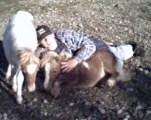The problem with acorns...
ACORNS AS A BASIC FOOD GROUP
This time of year, all we have to do to hear acorns dropping is stop talking for a minute. They are thick and with each rain or wind the ground becomes covered. To understand how acorns can be a problem for our horses we must know their nutritional makeup.
Acorns are indeed nuts but for some reason we have not developed an appetite for them. The obvious exceptions are the hickory, walnut, and pecans. Maybe it is because acorns have a thin shell and do not keep in the basement for months while we procrastinate about picking out the meats! The meat of the acorn is high in oil and very high in protein. This is where the problem lies.
The horse has for millions of years survived on forages. These tend to be low in protein and high in coarse roughage. This combination results in plenty of bulk along with bicarbonate generated by chewing the grasses. The bulk filling the intestinal tract buffered any strange feed the horse came across as they ranged the plains.
Once man came along and took control, the horse was confined to smaller paddocks. In return we provided concentrates and in many cases limited their supply of forages. With forages supplementing the grain, the horse did not have to spend all day looking for something to eat.
When the persimmons or acorns start falling, some horses will congregate under the trees to eat them. It appears the attraction to acorns is individual, but once started these individuals will spend much of their time waiting for the next acorn to fall! Since this obsession is to the exclusion of other activities, such as grazing, the horse eats a tremendous volume of acorns.
All of a sudden, the digestive tract is loaded with the high protein meal of nuts. The combination of high fat and high protein is a sudden change. The intestines’ natural response to such a strange feed is to purge it from the body. Fluids rush into the intestine to dilute out the new feed and form bulk which stimulates bowel activity. The protein of the nut meat inflames the lining, stimulating even more activity. The result of all this is a hyperactive bowel and a very watery, loose stool. So much water will be moved to the bowel the rest of the body will become dehydrated. The lining of the bowel can be so inflamed it swells, reducing any absorption of fluids the horse may take in. The combination of a hyperactive bowel, the swollen lining, the fluid loss, and resulting dehydration of the body can lead to a life threatening situation within hours. We may find the horse standing with its head down, breathing rapidly, and a watery stool wetting down the tail and hind quarters.
If you find a horse in this condition, and some of us will, treatment becomes an emergency situation. Large volumes of fluids are important to counteract dehydration and stabilize the blood flow. Protectents will line the intestine and protect it from additional contact with the acorns. Other medications will be needed to counteract shock.
About all we can do is shut the horses away from the trees until the acorns are frozen a few times. This makes them more digestible and lowers the protein. If there is not a plentiful supply of grass, free choice hay should be made available to keep the bowel full of roughage and buffer the acorns. This is a pretty grim picture but will hopefully increase awareness of what can happen when we see the horses racing across the pasture to reach the trees and gobble up the acorns.
CLICK BELOW TO DISPLAY A PRINTER-FRIENDLY COPY OF THIS ARTICLE
Select "Open this file from its current location," if you just want to print it out,
it will open in a simple word processing application, select the print button.
(unless you want to save this article in your computer's memory)

 ACORNS_AS_A_BASIC_FOOD_GROUP.rtf
ACORNS_AS_A_BASIC_FOOD_GROUP.rtf